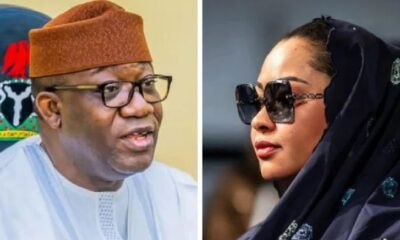News
Morocco dethrones Egypt, becomes main popular destination for tourist to Africa

By Francesca Hangeior
Morocco has crowned itself Africa’s most-visited destination, welcoming 17.4 million tourists in 2024—just a year after a deadly earthquake struck near its star destination, Marrakesh.
The milestone gives Morocco an edge over Egypt, which had long led the continent in tourism. Egypt also broke its own record, attracting 15.7 million visitors in 2024, but it wasn’t enough to hold on to first place.
Tourism revenue in Morocco also hit a new high in 2024, reaching $11 billion, up from $10.5 billion the previous year, according to the Ministry of Tourism.
While no central authority tracks arrival numbers for all African nations, UN Tourism data shows North African countries consistently dominate. Egypt, with its pyramids and the Nile, and Morocco, famous for its mountains, medinas, and celebrated cuisine, are in a league of their own on the continent.
By contrast, safari destinations in sub-Saharan Africa, such as South Africa and Botswana, attract far fewer visitors and earn only a fraction of North Africa’s tourism revenue.
Morocco’s 2024 numbers mark a 20 percent rise from 2023 and a more than 33 percent increase from pre-pandemic 2019 levels, when the country welcomed 13 million tourists. This surge has also put Morocco two years ahead of its tourism projections.
The rebound has been especially noticeable in Marrakesh, Morocco’s most visited city, which has recovered from both the Covid-19 tourism slowdown and the deadly September 2023 earthquake.
“We struggled after the earthquake. But today, things are better than ever. We’ve been fully booked for months,” said Nassim Ait Said, manager of Riad Nelia, a boutique hotel in Marrakech’s old square. “People are back to enjoy the beauty of Marrakech.”
However, the same cannot be said for the surrounding Atlas villages, once a haven for hikers and nature enthusiasts.
“The sight of tents and damaged homes doesn’t help attract sceptical tourists,” said Driss Zehrour, owner of Riad Vallée Vert in Douar Taourirte, near Asni, 50 kilometres from Marrakesh. “Unlike Marrakesh, people are still scared to come here.”
Hotel owners in the hardest-hit villages report occupancy rates below 10%. Rebuilding has been agonisingly slow; ruins and makeshift camps are still scattered across the region more than a year after the earthquake.
Residents, who have been protesting since last year against the lack of action, say the government has offered no explanation or reassurances.
While the recovery remains uneven, Morocco’s tourism ministry wants to break more records.
“These remarkable figures represent a major step towards our goal of positioning Morocco among the top 15 global tourist destinations”, Tourism Minister Fatim-Zahra Ammor said in a press release last week.
To break into the top 15, Morocco would need to overtake countries like Japan, which welcomed 25 million international tourists in 2023, the most recent year for which UN data is available.
Ammor highlighted several factors driving Morocco’s growth in a social media post, including the introduction of 120 airline routes in 2024—such as United Airlines’ Newark-Marrakech nonstop—and new luxury hotels from brands like Four Seasons and Nobu across the country.
Morocco has also leveraged the success of its national football team, the Atlas Lions, who made history as the first African team to reach the World Cup semifinals in 2022.
Their success is now woven into Morocco’s tourism promotion. Trailers showcasing the Atlas Lions greet visitors at Marrakech airport, murals of Achraf Hakimi’s Panenka and Yassine Bounou’s iconic saves adorn streets, and the team’s legend continues to attract fans from around the world.
The record-breaking year comes as Morocco prepares to host the Africa Cup of Nations (AFCON) from December 2025 to January 2026, an event expected to draw soccer fans worldwide.
By 2030, when Morocco is set to co-host the FIFA World Cup with Spain and Portugal, the country aims to welcome 26 million tourists annually—50 percent more than its current figures.
News
Court Orders Fast-Tracked Trial Of 15 Workers Held In Prison For 6 Yrs Over Patience Jonathan’s Missing Jewellery
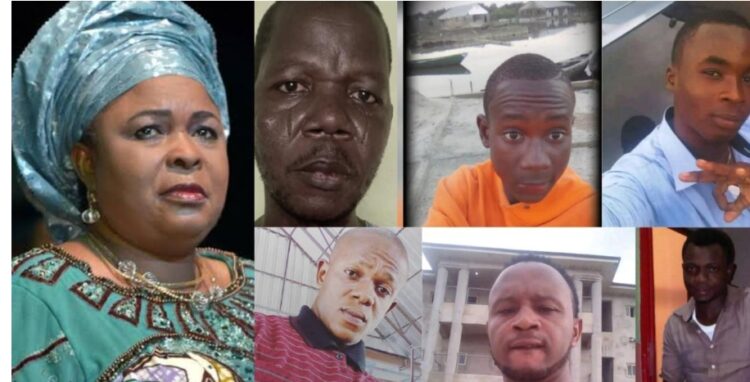
The Bayelsa State High Court has ordered a fast-tracked trial for 15 domestic workers who have spent nearly six years in detention at the Okaka Correctional Centre, Yenagoa, without conviction, over missing jewellery belonging to former First Lady Patience Jonathan.
SaharaReporters gathered that the order came after the prosecution and defence teams reached a rare consensus during Thursday’s proceedings to fast-track the case, which has suffered deliberate and serial delays allegedly masterminded by Patience Jonathan’s private legal team.
“The court proceeded well today, and both parties have agreed to finish the case as soon as possible, with an accelerated hearing. So victory is coming,” a source close to the defence told SaharaReporters.
The 15 accused persons, most of whom were part of Mrs Jonathan’s domestic staff, were arrested in 2019 and have remained in detention without bail, with the case dragging on endlessly for years amid reports of consistent manipulation of court processes.
A previous report by SaharaReporters exposed a pattern of intentional court delays reportedly orchestrated by Mrs Jonathan’s private prosecutors, Ige Asemudara and Samuel Chinedu Maduba, both of whom have been consistently representing the former First Lady since 2019.
“The prosecutors are Ige Asemudara and Samuel Chinedu Maduba,” one of the sources confirmed.
“One of them comes from Lagos while the second travels in from Port Harcourt. They’ve been handling this case from day one, presenting witnesses who come to tell lies. One witness took almost two years,” a source earlier told SaharaReporters.
Sources alleged that Mrs Jonathan gave direct instructions to delay the proceedings.
“The aim is to frustrate the process and keep these innocent people in prison as long as possible. It’s an abuse of the legal system,” a source close to the courtroom told SaharaReporters.
The delay tactics reportedly included health excuses, unreachable witnesses, and repeated adjournments based on flimsy reasons. “Sometimes, Ige Asemudara would claim he is sick or his witness has work. Other times, he just asks for long adjournments,” said another insider.
Shockingly, the judiciary itself was not spared from complicity allegations. A source revealed that the presiding judge initially delayed hearing the bail applications, claiming she wanted to listen to some of the prosecution’s evidence first to determine the nature of the charges.
“When the case started in 2019, they all applied for bail,” the source said. “But the judge told their lawyers to wait so she could hear some evidence. After that, she shockingly denied bail, saying the offences were capital and therefore not bailable.”
Meanwhile, the Bayelsa State High Court has denied any involvement in the delays, recently restating its commitment to speedy justice and dismissing reports of suspects’ trials being delayed.
The court, in a reaction to reports that alleged that the trial of 15 domestic workers facing trial for burglary and theft of jewellery, was being delayed, said the claim was false.
It claimed that, according to available records, the matter had suffered delays due to multiple defence lawyers who must cross-examine witnesses, which had slowed down proceedings. It added that the case had also suffered several adjournments at the instance of counsel.
The delays have left the defence team and families of the detainees stunned, particularly since the prosecution reportedly failed to produce any convincing evidence to support the capital charges.
The affected persons are Williams Alami, Vincent Olabiyi, Ebuka Cosmos, John Dashe, Tamunokuro Abaku, Sahabi Lima, Emmanuel Aginwa, Erema Deborah, Precious Kingsley, Tamunosiki Achese, Salomi Wareboka, Sunday Reginald, Boma Oba, Vivian Golden and Emeka Benson.
They have remained behind bars without justice, caught in the web of power, influence, and a compromised legal process.
With the court finally conceding to an accelerated hearing, hope has once again sparked for the victims of this legal nightmare.
News
Catholic Church gives Anambra APC guber candidate rigid conditions for support
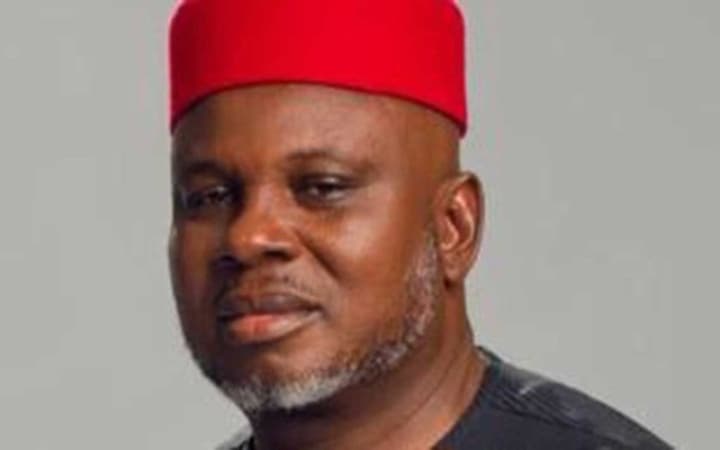
Barely 10 days after he emerged as the All Progressives Congress (APC) gubernatorial standard bearer for the November 8 gubernatorial poll in Anambra State, Prince Nicholas Chukwujekwu Ukachukwu has been given rigid conditions to receive the support of the Catholic Church in the state.
Sources told The Guardian that the basic conditions set before the APC governorship candidate include the selection of a deputy from the Catholic fold, and also that 60 per cent of his cabinet must be Catholics.
This is just as the APC governorship hopeful has been inundated by lobbyists for the position of running mate, even as he engaged with concerned APC stakeholders in the state in a bid to find common ground with various women groups agitating for gender parity.
The Guardian learned that the race for Ukachukwu’s running mate had been narrowed down between two former female Senators, Dr. Uche Lilian Ekwunife and Dr. Margery Okadigbo, who hail from the Central and North Senatorial Districts of the state, respectively.
Although both female politicians are Catholics, the factor of zoning is said to be impacting their chances, because while the more politically active Ekwunife hails from the populous Anambra Central District, Mrs. Okadigbo is from Anambra North, which has just served out eight years of governorship through Willie Obiano.
Also, the fact of her maiden community, Igboukwu in Aguata Local Council, and influence as the current Director General of South East Governors’ Forum is ticking in Ekwunife’s favour, as her candidacy is expected to help slice the votes in Old Aguata Union from where the incumbent Governor Chukwuma Soludo hails. (The Guardian)
News
NJC investigates 18 Imo judges over suspected age falsification
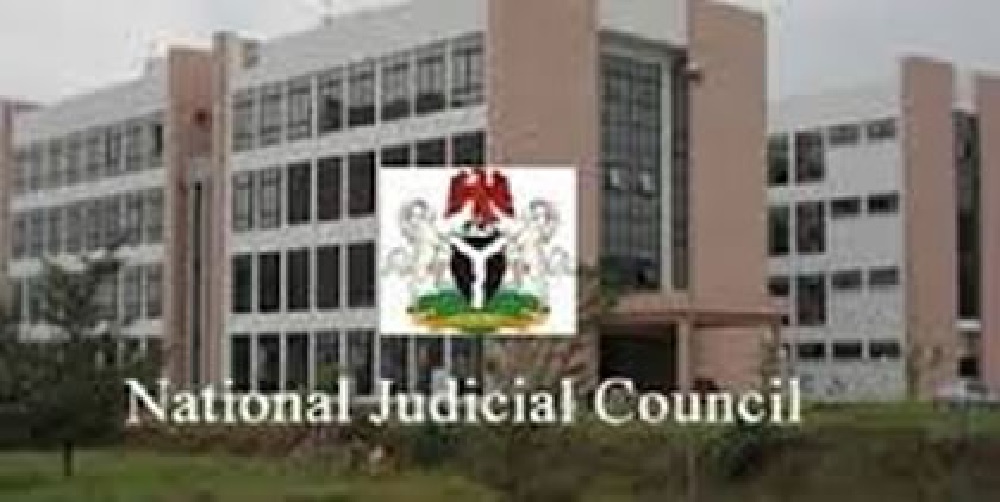
The National Judicial Council has launched a probe into 18 judges in the Imo State judiciary over allegations of age falsification, in a development raising fresh concerns about integrity and transparency within Nigeria’s judicial system.
The NJC, in a statement on Thursday by its Deputy Director of Information, Kemi Ogedengbe, confirmed that the allegations were being treated with utmost seriousness and were currently under review.
“Allegations of this nature require detailed investigation before any action can be taken,” Ogedengbe stated.
“The NJC is investigating the allegations and may take a decision by the end of the month. For now, we cannot act without completing our inquiries. The council will convene and make decisions on the matter.”
The investigation follows a petition submitted by a civil society group, Civil Society Engagement Platform, which described the matter as an “unprecedented breach of judicial integrity.”
The group alleged that the judges deliberately manipulated their birth records to either prolong their tenure or gain appointments within the judiciary.
In a letter addressed to the NJC Chairman and Chief Justice of Nigeria, Justice Kudirat Kekere-Ekun, the platform cited discrepancies in the judges’ official documents, including Law School registration forms, Department of State Services reports, and Nominal Rolls.
The petition, signed by CSEP’s Director of Investigation, Comrade Ndubuisi Onyemaechi, included what it described as compelling documentary evidence marked as Exhibits 001 to 018.
Among those named in the petition is Justice I. O. Agugua, who reportedly has two different birth dates—May 10, 1959, and May 10, 1960—and is also facing separate allegations of misconduct.
Justice C. A. Ononeze-Madu is alleged to have birth records stating both July 7, 1963, and July 7, 1965, while Justice M. E. Nwagbaoso is accused of presenting conflicting dates of birth—August 20, 1952, and August 20, 1962.
The remaining 15 judges also reportedly have varying inconsistencies in their personal data, a revelation that has intensified public scrutiny of the judiciary’s accountability mechanisms.
The NJC, which is constitutionally empowered to discipline judicial officers, is expected to reconvene soon to deliberate on the findings of its inquiry and take appropriate disciplinary actions where necessary.
The unfolding development comes amid mounting calls for institutional reforms to restore public trust in the judiciary and reinforce ethical standards across all arms of government.
-

 News24 hours ago
News24 hours agoBREAKING: Unknown gunmen reportedly storm Senator Natasha’s family residence
-

 News18 hours ago
News18 hours agoAbuja light rail project must be commissioned on May 29-Wike vows
-

 News23 hours ago
News23 hours agoLawmaker Slams NBA Over Rivers Crisis, Demands Return of N300m
-

 News9 hours ago
News9 hours agoTinubu Remains Engaged In Governance From Europe, Will Return After Easter – Presidency
-

 News22 hours ago
News22 hours agoFinally , Lagos Court frees Quadri, young Nigerian who stood before Obi’s convoy in viral photo
-
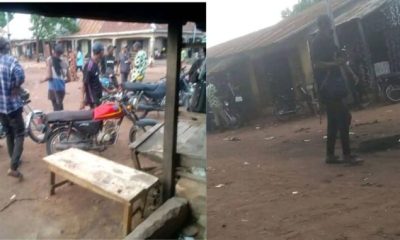
 News19 hours ago
News19 hours agoJust in: Alleged Herdsmen Armed With AK-47 Rifles Take Over Communities In Benue State
-

 News19 hours ago
News19 hours agoSEYI Tinubu Speaks On Alleged Abduction, Brutalization Of NANS President Atiku Abubakar Isah
-

 News8 hours ago
News8 hours agoFirst Lady Convoy Kills Seven-Year-Old Girl In Ondo State




